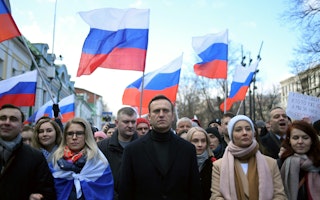Why Institutions Fail to Recognize Human Rights Abuses
In the former Soviet Union, longstanding institutions like the Council of Europe and the Organization for Security and Cooperation in Europe are under attack from both outside and within. Squeezed by economic instability, conflict, migration, and threats to human rights, at times these institutions have buckled under pressure from authoritarian regimes and their supporters.
A recent report by the Foreign Policy Centre, Institutionally Blind? International Organizations and Human Rights Abuses in the Former Soviet Union, identifies many examples of institutions overlooking or burying criticism of human rights abuses. According to the report, these lapses in duty spring from an array of factors, including budget freezes, political interference, and politicians rubber-stamping results for pro-government groups.
Take, for example, the Parliamentary Assembly of the Council of Europe, an institution that has developed a reputation as fertile ground for lobbyists working for repressive governments. There are a number of reasons why parliamentarians might not rise to the challenge of scrutinizing these lobbyists’ arguments properly.
Parliamentarians, for the most part, are not initially experts on the countries on which they work. Their ability to spend time on the ground will often depend on an external group taking them there—in many cases, a group that’s affiliated with the region’s ruling elites. Moreover, groups providing parliamentary briefings on these countries tend to be pressure groups or think tanks with links to the regime, leading to dialogues based on the misperception that these countries are “emerging democracies,” when, in fact, they are consolidated authoritarian regimes.
In addition, for a variety of reasons, some parliamentarians may not be comfortable pushing human rights concerns. They might be reluctant to put “values promotion” ahead of security, economic, and energy needs. Others may feel that promoting human rights amounts to a display of Western hypocrisy. And still others may believe they best serve their domestic constituencies if they tone down such criticisms, particularly in the presence of firms with business interests that could benefit their region.
Most controversially, however, are instances in which politicians gain personally from taking an uncritical approach to particular regimes, behavior that can be divided into two main categories. The first is gift giving and direct financial support, or so-called caviar diplomacy. This includes payments made to parliamentarians for providing “advisory services” to pro-government groups—or, conversely, such groups providing assistance to parliamentary offices. It may not be illegal, provided the gifts and business arrangements are appropriately declared, but there is a strong whiff of impropriety when recipients subsequently parrot the talking points of the gifting regime.
The second category could be termed caviar-flavored diplomacy. This would include behavior that may be seen as inappropriate or unethical but is not immediately transactional in nature, such as when a parliamentarian limits criticism of a regime in the hopes of cultivating contact networks or favors that could be beneficial to his or her future business activities.
If these parliamentary bodies are to fulfill their duties to monitor and respond to human rights abuses, national parliaments must improve the transparency of their international delegations. Likewise, NGOs and the institutions themselves must continue to increase scrutiny of the relationships between parliamentarians and groups aligned with former Soviet governments. These important institutions must not become blind to the abuses committed by governments in the former Soviet Union and Europe.
The Foreign Policy Centre is a grantee of the Open Society Foundations.


